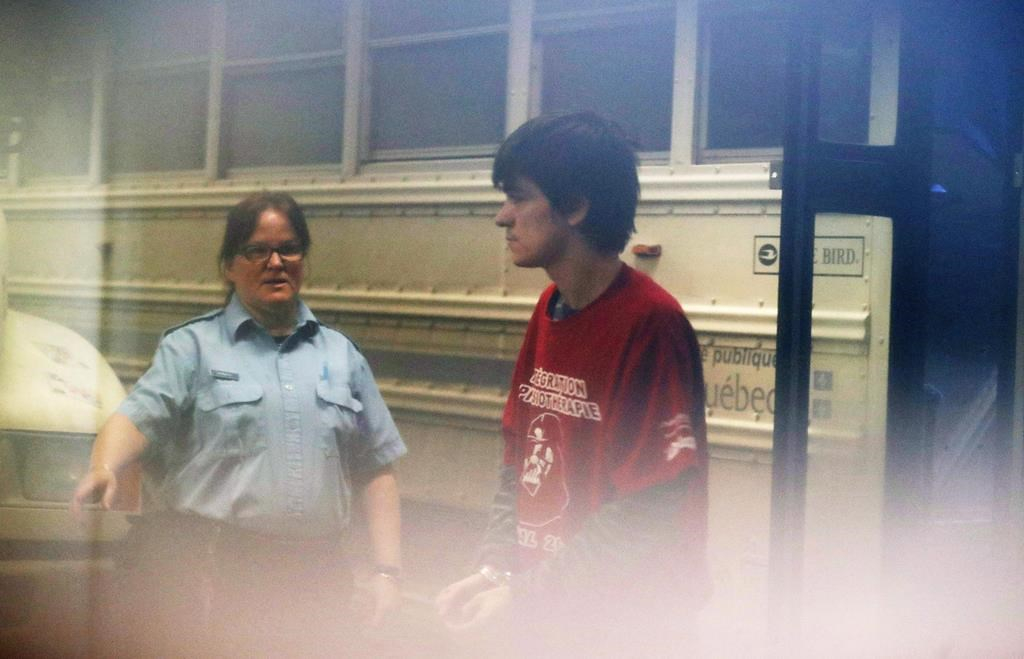Support strong Canadian climate journalism for 2025
The man who gunned down six Muslim men in a Quebec City mosque deserves to spend 150 years in prison, a Crown prosecutor said Tuesday as he recommended Alexandre Bissonnette receive the longest sentence in Canadian history.
Bissonnette's crimes are "despicable, repugnant ... and equate to terrorism," said prosecutor Thomas Jacques at the killer's sentencing hearing.
Earlier this year, Bissonnette, 28, pleaded guilty to six charges of first-degree murder and six of attempted murder after he walked into a mosque in the provincial capital on Jan. 29, 2017, and opened fire.
A single first-degree murder conviction carries an automatic life sentence with no chance of parole for 25 years.
Quebec Superior Court Justice Francois Huot could multiply Bissonnette's sentence by the number of people he killed and therefore order the shooter serve 150 years in prison before he becomes eligible for parole — meaning he would die in custody.
Bissonnette's lawyer, Charles-Olivier Gosselin, has portrayed his client as an anxious and fragile man and suggested he be eligible for parole after 25 years.
Jacques told the judge Bissonnette deserves a sentence that is proportionate with the "carnage" he inflicted on the city's Muslim community, and on the rest of the country.
Bissonnette began considering mass killing in 2015, Jacques said.
A year later, he chose his target, Quebec City's mosque, the prosecutor continued.
"It's not a trivial location," he said. "It's a place of worship, a saintly place, a sacred place."
Not only was the killing premeditated, but the shooter was determined, acted methodically and with cruelty, Jacques said.
Bissonnette even smiled at a couple of people in the mosque "to give them hope," before coldly executing them, Jacques added.
"What happened is a black eye on all the values protected by Canadian society," Jacques told the judge.
Mohamed Labidi, ex-president of the mosque, was at the courthouse and said, "all the families of the victims ... want an exemplary sentence. They want the maximum the law allows."
Bissonnette's defence team has requested the trial judge declare consecutive sentences — a part of the Criminal Code since 2011 — unconstitutional and invalid.
After Huot finishes hearing arguments on sentencing, he'll decide whether the parties should move forward with a debate on the defence's motion to declare consecutive sentences unconstitutional.
Earlier on Tuesday, defence lawyers argued Bissonnette's case was vastly different from those in which convicts received consecutive sentences.
They cited cases involving the cannibalism of a two-year-old child, women who were murdered simply for their gender, as well as a case in which a woman was stabbed to death, along with her parents, after she considered leaving her husband.
Defence lawyers also cited the case of Moncton shooter Justin Bourque, who was sentenced to life in prison with no chance of parole for 75 years after he murdered three RCMP officers and wounded two others. The judge in the case noted that Bourque had not shown any remorse.
"What we see in these decisions ... are particularly heinous crimes, awful, and committed in relatively long intervals, over several days," defence lawyer Jean-Claude Gingras said.
In contrast, Bissonnette admitted his crime, surrendered to police, and always co-operated with the authorities, Gingras said.
Bissonnette was described by his defence team as a sick young man but someone who can be rehabilitated and who has repeatedly shown remorse, shame, and who has been described by experts as representing a low to moderate risk of recidivism.
A consecutive sentence would "annihilate" Bissonnette's chances of rehabilitation and rob him of hope, Gosselin said.
Huot interjected at that point, noting that the crime was, "to my knowledge, a unique situation where 50-52 victims were targeted because they belonged to a particular group.
"It's quite difficult to try to classify the degree when comparing a horror situation to another horror situation," the judge said.
Huot has said he expects to deliver a sentence by September.



Comments